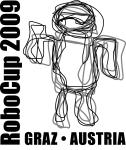
Carlos Jaramillo's
Distributed Research Experience as Undergraduate (Summer 2009)
ROBOCUP 2009
| Home |
| The Lab |
| About Me |
| My Mentor |
| RoboCup 2009 |
| Final Report |
| The Project |
| Journal |
| Tips |
Activities Statement
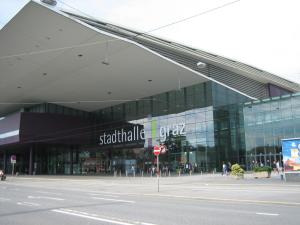 My mentor, Elizabeth Sklar, was a RoboCup Trustee representing the Junior division.
The RoboCup 2009 event was held at the Stadthalle Graz, Austria from June 29 to July 5. The event's website
is:
http://www.robocup2009.org
My mentor, Elizabeth Sklar, was a RoboCup Trustee representing the Junior division.
The RoboCup 2009 event was held at the Stadthalle Graz, Austria from June 29 to July 5. The event's website
is:
http://www.robocup2009.org
My DREU colleague, Andres Concepcion, and I, participated as volunteers for the RoboCup Junior Rescue team, with participants from primary and secondary schools from about 30 different countries. In the venue, we worked on organizing student teams, rescue and dance challenges, refereeing robot soccer and rescue games, and generally helping out the event organizers.
We were also able to attend the academic conference portion of the event, the RoboCup International Symposium to hear talks on a wide range of topics on robotics research, such as:
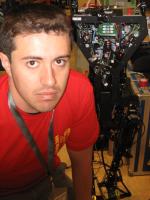
|
|
Journal of the Event
-
The local chairs of RCJ Rescue:
- Karl Voit
- Willibald Krenn
 Wednesday:
Registration opened at 8 am on Wednesday.
At 3:00 pm we attended a meeting with test-runs so that we
could make sure everything was clear for all volunteers.
Wednesday:
Registration opened at 8 am on Wednesday.
At 3:00 pm we attended a meeting with test-runs so that we
could make sure everything was clear for all volunteers.
Thursday to Saturday:
We started each day with a meeting of all volunteers at 8:30 am.
The first round (round = "all primary or secondary teams have one run on
the competition fields") started at 9:30 am. At 11:00
am we had the second round of the day. (Note that one round
lasts 90 minutes.)
From 12:30 am to 2 pm there is a break where we all had lunch and
recovered a little bit. The afternoon runs started at 2 pm: The first one lasted until
half past three pm (15:30). We then had a 30 minutes break and proceeded with
the last run of the day from 4 pm to half past 5 pm (17:30).
We had a very short meeting afterwards.
Sunday: On Sunday we only had rounds among the best SuperTeams, and the closing ceromony at 2 pm
Workflow & General Plan
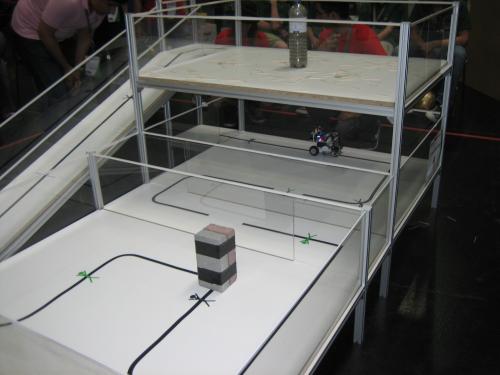 The follwoing is an idea about the workflow and
the general set up:
The follwoing is an idea about the workflow and
the general set up:
There were three competition and four practice fields at our disposal, and there were 25 primary and 34 secondary teams registered. One run lasted 15 minutes comprising 8 minutes competition, and 5 minutes "change time".
We had one judge and one "writer" per team and two teams per competition field. (Hence, 2 judges and 2 writers per field.) Within the 5 minutes change time, the mark sheets have to be transferred to the back office.
There were a few volunteers supervising the practice fields, and one or two in the back office, entering score sheets.
Map of the Venue at Stadthalle Graz
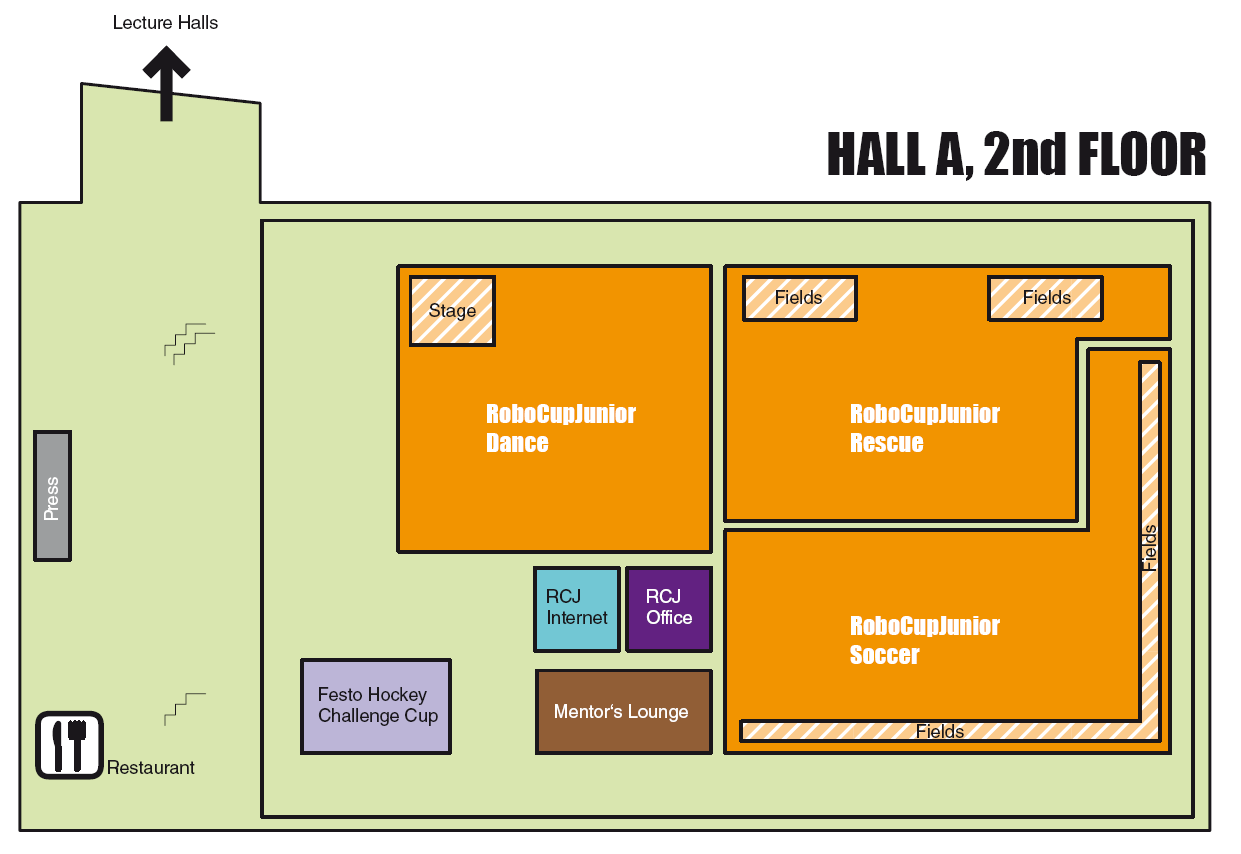
Certificate of Participation
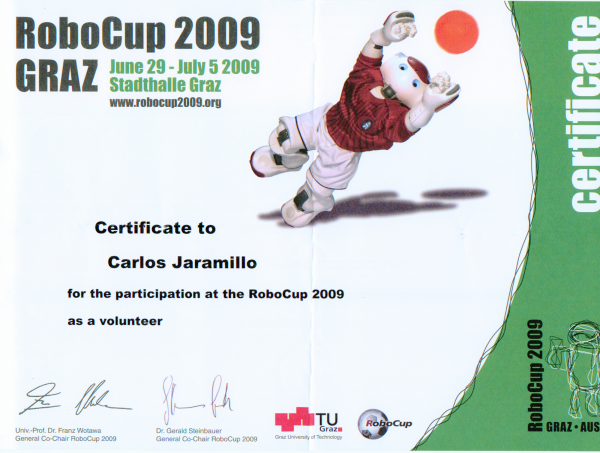
Final Thoughts About the Event
My experience at RoboCup 2009 (Graz, Austria) increased my passion for robotics
and technology, and it has made me aware of the current limitations we are
facing regarding to what has been done and what still needs to be accomplished -
specially with humanoid robots, as the ambitious Robocup's goal of one day being
able to have a futbol-soccer match between humans and robots.
As a volunteer, I was assigned the role of judge and score-writer for the
Robocup Junior Rescue competition, which allowed me to observe how education
with robots has quickly spread around the world at such young ages. However,
myself being a minority (born and raised in South-America), I was
disappointed to find out that the absence of competitors from this continent,
with the exception of Brazil.
In this year's Juniors' league, two teams of participants were grouped into
"superteams", with the attempt of enhancing the sense of community and to give
participants the opportunity to make friends with people from different
cultures. At a more personal level, I was lucky to meet organizers, volunteers,
and participants from all over the world, with whom I could exchange ideas and
opinions about our common interest in the field of robotics and technology.
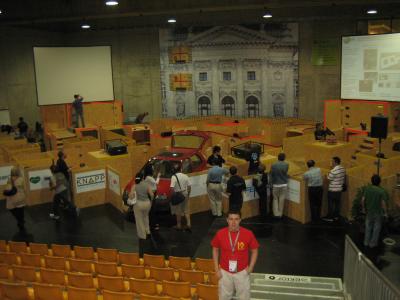 I was a little disappointed by not seeing open-source software being heavily
used across the majority of teams. However, the Symposium talks that I was able
to attend were mostly based around open-source projects.
There were many demonstrations going on during the event such as the Car
Ibeo LUX which was an autonomous system demonstration, the Nanogram
demonstration competition, simulated 2D and 3D Robocup Soccer and Rescue
Leagues, RoboCup at home showing the human-machine interaction with autonomous
robots in daily life, Mixed Reality robotics that is based on 2 cm tall robots
operated on a horizontally mounted display, and even the Festo Hockey Challenge
Cup that uses robots to play an ice hockey game. Of course, the different
Soccer, Dance (Juniors only), and Rescue Leagues were competing throughout the
event that lasted for about 6 days.
I was a little disappointed by not seeing open-source software being heavily
used across the majority of teams. However, the Symposium talks that I was able
to attend were mostly based around open-source projects.
There were many demonstrations going on during the event such as the Car
Ibeo LUX which was an autonomous system demonstration, the Nanogram
demonstration competition, simulated 2D and 3D Robocup Soccer and Rescue
Leagues, RoboCup at home showing the human-machine interaction with autonomous
robots in daily life, Mixed Reality robotics that is based on 2 cm tall robots
operated on a horizontally mounted display, and even the Festo Hockey Challenge
Cup that uses robots to play an ice hockey game. Of course, the different
Soccer, Dance (Juniors only), and Rescue Leagues were competing throughout the
event that lasted for about 6 days.
More information about this event can be found at its website
www.robocup2009.org .I believe that my participation in this event was a
valuable experience that is closely related to the research work I am
undertaking with Prof. Sklar, who has been involved with RoboCup for several
years. Being so close to the different leagues and their respective games
allowed me to better understand the benefits of these types of event in robotics
that promote research and education through innovation and challenge.
